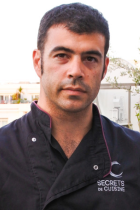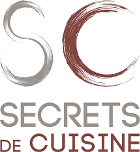Cedric Seguela: Founder of Secrets de Cuisine

As regulations in the yachting industry increase, no department is immune. Under MLC 2006, as of 7 August 2014, it is a requirement for all chefs/cooks onboard charter yachts with 10 or more crew to have an MCA Ships Cook Certificate.
Secrets de Cuisine is the only cooking school in the south of France accredited by MCA to provide the Ship's Cook Certificate and we met up with the boss, Cedric Seguela, to get his thoughts, his insight on the role of a yacht chef and the wider trends in high end cuisine.
As a trained chef, how did you start out in the yachting industry?
I started cooking at the age of 14 and I’ve always been passionate about it. My first job was on cruise ships, then my wife, Milica, and I decided to settle down on the French Riviera. I didn’t know about the yachting industry then, but Milica saw an ad on the internet and sent my application, and a couple of days later I had a job onboard a charter yacht!

Was it as you expected or were there some surprises?
What surprised me the most was the size of the boat, it was a busy 43m charter yacht, which was rather large at the time, but a small boat compared to a cruise ship. I didn’t think the galley would be big enough to cater three meals a day for 12 crew and 12 guests.
When I joined, I also discovered I was replacing a chef who was let go the same day so the owner and guests were already onboard. I had to produce dinner for everyone within two hours of arriving using whatever was left in the fridge. That was a fairly steep learning curve and my introduction to yachting.
When did you start Secrets de Cuisine and how did it come about?
After my first daughter was born, I decided I wanted to work ashore so I started Un Chef à Domicile, a private chef/catering company which I’ve been running for 11 years now. I then started Secrets de Cuisine, a cookery school offering the MCA Ships Cook Certificate for yacht chefs, as well as Food Safety Levels 2 and 3, so I’ve always remained connected to yachting.
As the yachting industry becomes more regulated, what are the challenges for yacht chefs today?
Some of the regulations we are talking about are not new. For example, the Ship’s Cook certificate falls under the Maritime Labour Convention 2006 which came into force in August 2013. Subsequently, as of 7 August 2014, it is a requirement for all chef/cooks onboard charter yachts with 10 or more crew to have an MCA Ships Cook Certificate.

Ships Cook Certificate
The MCA Ships Cook Certificate of Competency is recognized globally, allowing yacht chefs to work on any vessel worldwide, ehnancing your career and job prospects. As well as being a legal requirement, it also creates a level playing field on which captains and recruiters can base hiring decisions.
In order to obtain the MCA Ships Cook Certificate, all chefs/ cooks, qualfied or not, need to undergo a Ships Cook Assessment so their culinary skills can be assessed in a controlled environment. Bluewater Yachting in conjunction with Secrets de Cuisine in Antibes are currently the only organisations in the world able to conduct the assessment in just two and a half days.
The industry is becoming more regulated, but it’s just catching up with land based requirements, where a certain level of competency is requird in order to work in any kitchen.
Food Safety Levels 2 & 3
Under UK and European law, all employees who have a role in handling food must attend a basic food safety course, Food Safety Level 2 (QCF). The qualification is intended for those already working on yachts as well as those plannning to join the industry and covers food storage, preparation, cooking service and food handling. Food Safety Level 3 is compulsory for heads of departments with responsibility for preparing or serving food.
A list of accepted qualifications can be found in MIN 479 which does not include online food safety certificates.
 |
 |
In your view, what are the defining factors for a successful chef onboard or ashore?
A yacht chef needs to be versatile and have a wide range of culinary skills to be able to cater for different nationalities, religions and dietary requirements. Yacht chefs also need good pastry and baking knowledge, which are paramount when you have only your own skills to rely on.
Unlike in hotels and restaurants, yacht chefs often work on their own or in a small team, so there’s very little interaction leading to improvement or exposure to new culinary ideas. It requires a lot of motivation and self discipline to continue developing throughout a yachting career. During a busy season, the main challenge is to stay motivated so you perform well on a daily basis.

Is it easy for chefs to move between yachting and land based roles?
It’s quite easy to move from a land based role to yachting, but not so easy the other way around. First of all, wages are better in yachting than on land. Secondly, the job is very different and there’s no real equivalence. For example, if you’re a head chef on an 80m superyacht, it doesn’t mean you’ll automatically get a head chef job in a 5 star hotel or a Michelin star restaurant.
What would you change if you could?
I would certainly try to incorporate different recruitment methods for yacht chefs. With current methods I believe it’s very difficult to know whether or not you have picked the right chef for the season.
What are the trends in high end cuisine at the moment?
After going through a fairly big rush of modern and molecular cuisine, with pioneers such as El Bully and The Fat Duck, we seem to be going back to our roots. Molecular and modern cuisine is highly technical and demanding, and requires a substantial amount of resources to develop and master recipes. Just like any fashion, gastronomy goes through cycles, but I think that more and more chefs are now looking to find the right balance between creativity and genuine cuisine.

Which chefs have inspired you?
One of the chefs I admire the most is Michel Bras, renowned for using local products and enhancing their value without spoiling natural flavors. His restaurant in Laguiole in the Aveyron has had 3 Michelin stars since 1999 and the handover to his son Sebastian was seamless, maintaining the quality and spirit.
What is the most important thing you’ve learned so far?
When I started as a chef I was thrown into the pastry section, which wasn’t my aim at the time. Since then I’ve spent half my time in savoury cuisine and half in pastry, and now I’m grateful to have this versatility.
Which is your favourite dish?
Coming from Toulouse, a good cassoulet once in a while would be my favorite dish!
Which is your favourite maritime destination?
Waking up and having breakfast on the aft deck of a yacht while entering the lagoon in Bora Bora was one of the most amazing maritime experiences so far, so I’d say Bora Bora just for that!


Post your comment
You cannot post comments until you have logged in.
Login to post a commentComments
No one has commented on this page yet.
RSS feed for comments on this page | RSS feed for all comments